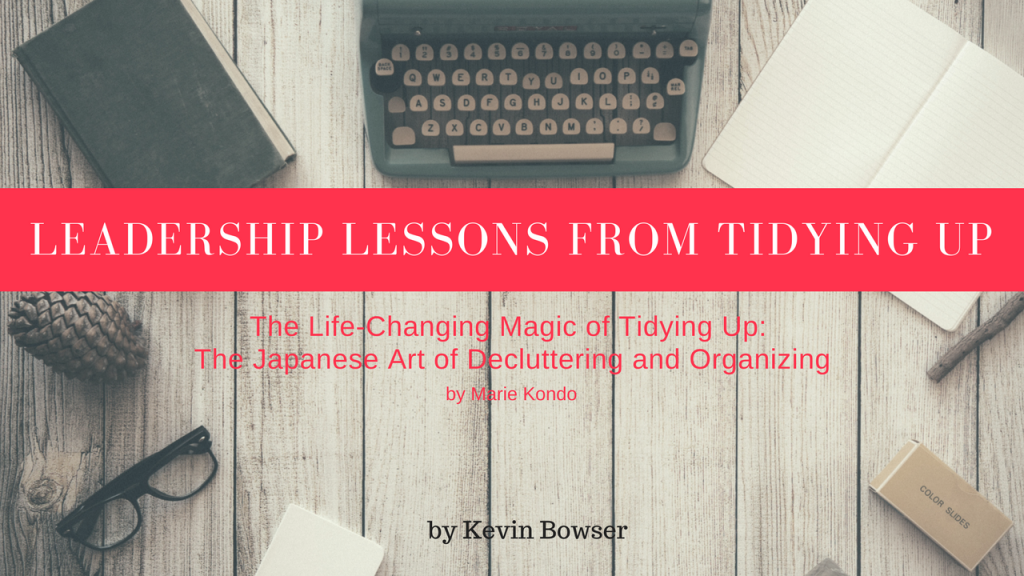Like many of you, I am still trying to work out some of the finer details from the goal setting that is so much a part of this time of year. One of the goals that I have set for myself this year is to be more organized (less cluttered) in my own personal life. I have also set a goal of redeeming some of the lost time that I spend in my car while commuting to and from the office. One of the ways that I am dealing with both of these goals is to listen to an audio book on tidying while I drive. Please don’t shame me, but I am listening to an audio book in the car is a first for me.
The book that I have selected is The Life-Changing Magic of Tidying Up: The Japanese Art of Decluttering and Organizing by Marie Kondo. Marie Kondo is a Japanese cleaning consultant. She takes tidying to a whole new level. She claims that if you properly simplify and organize your home just once, and you do it according to her “KonMari Method”, you’ll never have to do it again. Her method, with its revolutionary category-by-category system, leads to lasting results according to her book. In fact, none of Kondo’s clients have lapsed back into their old cluttered lifestyle once they graduate from her class and the in-home process. Further, she claims to have a 3-month waiting list to have her consult with you in your home or office.
I love many things about Japanese culture. I value the simplicity of design and the almost stark or Spartan look to the interiors of many Japanese homes. For me, it is almost like walking into a hotel room. I am relaxed and energized by the uncluttered look and feel to a hotel room. Aside from a bed, a work surface, a TV and a coffee maker, most hotels lack many of the things that we feel we must have in our homes. Apparently, for me, that is not the case. In fact, I am usually extremely productive in a hotel room when it comes to creative activities and planning.
Why is that so?
I believe that it is so because hotel rooms lack the distractions that you and I must deal with in our offices and in our homes. Offices have chatter from nearby conversations, smells emanating from the break room where someone has left the popcorn in the microwave about 45 seconds too long, and colleagues who want to “collaborate.” Home is the same and much more so. Things around us just seem to distract us from focusing on our task at hand.
What is the leadership lesson from tidying up?
One of the key principles of the KonMari Method is to first of all “declutter.” Many of us fail by trying to organize first. That has certainly been true for me. Marie Kondo participates with her clients in a grand decluttering of their homes and offices. They start with clothes and work their way down to papers and photographs. I will not go into detail and explain her methodology. But she instructs her clients to physically touch every item in the category of items that they are currently decluttering. And she has the client ask themselves, “Does this item bring me ‘joy’?” If it does not, she has them discard the item and place it in a garbage bag or recycling bag. It is staggering to hear her describe how much “stuff” gets discarded in this phase.
So, what is the leadership lesson?
The leadership lesson is that sometimes leadership development is not about adding a bunch of skills, abilities, tactics, or methodologies. Sometimes leadership is best experienced when we shed ourselves of much of the clutter and the trappings of what the world says a leader must act like and do. I don’t know about you, but I experience clutter in my mind more often than not. And when my mind is cluttered I simply cannot focus on the leadership tasks that are at hand.
What clutters our leadership?
Fear – Fear clutters everyone’s mind from time to time. Who really cares if it is “fear of failure” or “fear of success?” Fear clutters our minds and can debilitate us. Leaders need to discard the fear and the anxiety that accompanies it.
Busyness – Busyness clutters our schedules. We don’t have bad things on our schedules. At least I hope not! Our calendars are filled with so many things that are good. They just aren’t vital. What would happen if we deleted every meeting from our calendars that we are just “CC:” invitees and only attended the meetings that we were specifically invited to attend?
Priorities – Priorities are similar in some ways to busyness. What if we examined each of the activities that draw our attention and examined them with the same rigor as Marie Kondo describes to her clients as they decide what to keep and what to discard? How much leadership capacity would be freed up if we were focusing on our highest priorities?




Please note: I reserve the right to delete comments that are offensive or off-topic.